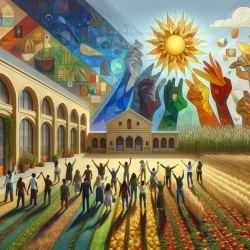Empowering Practitioners: Insights from Political Empowerment Research
As practitioners in the field of social work, understanding the dynamics of political empowerment is crucial, especially when working with vulnerable populations such as community college students receiving food assistance benefits. The research article titled Diverse Views of Political Empowerment Among Community College Students Who Receive Food Assistance Benefits provides valuable insights into how these students perceive and engage with political systems, particularly in relation to voting.
Understanding Political Empowerment
Political empowerment involves having the power, ability, critical awareness, and sense of group identity to take action to create change within a political system. This research highlights the diverse ways in which community college students who receive food assistance perceive their role in the political landscape. The study suggests that choosing not to vote can also be a form of political empowerment, reflecting a conscious decision based on critical awareness of the political system's impact on their lives.
Key Findings and Implications for Practitioners
The research identifies four distinct voter types among the participants: dedicated voters, voters, nonvoters, and dedicated nonvoters. Each type demonstrates different levels of critical awareness and empowerment:
- Dedicated Voters: These individuals vote consistently, driven by a belief in the importance of participating in elections. They exhibit self-efficacy and critical consciousness but may not always identify with other recipients of means-tested assistance.
- Voters: This group votes but often lacks a deep understanding of how politics affects their lives. They may not connect their voting decisions to their status as food assistance recipients.
- Nonvoters: These individuals are generally apathetic about politics and do not see its relevance to their lives, often due to a lack of critical awareness.
- Dedicated Nonvoters: Unlike nonvoters, dedicated nonvoters are not apathetic. They are critically aware of how government policies impact their lives but choose not to vote as a form of resistance against a system they perceive as unresponsive to their needs.
For practitioners, these findings underscore the importance of addressing the structural and psychological barriers that prevent marginalized groups from engaging in the political process. Social work interventions can focus on:
- Reducing stigma around government assistance.
- Encouraging voter engagement by highlighting the importance of political participation.
- Working with systems to recognize and amplify the political power of marginalized groups.
Encouraging Further Research and Practice
Practitioners are encouraged to delve deeper into the nuances of political empowerment and explore how these insights can be applied to improve outcomes for their clients. Understanding the diverse perspectives on political empowerment can inform more effective interventions and advocacy efforts.
To read the original research paper, please follow this link: Diverse Views of Political Empowerment Among Community College Students Who Receive Food Assistance Benefits.










